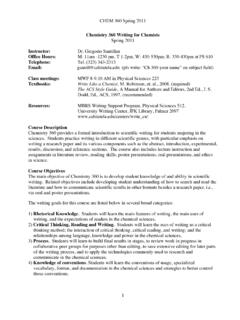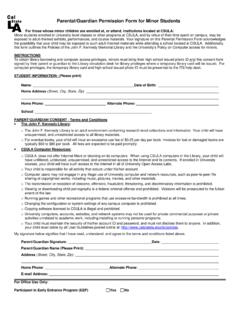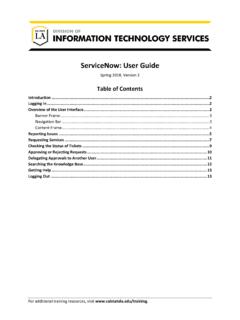Transcription of Accelerated Bachelor's of Science in Nursing Pre-Requisite ...
1 Accelerated Bachelor's of Science in Nursing Pre-Requisite coursework ( 31 semester units or Equivalent). Human Anatomy and Physiology I with lab [4 semester units] (BIOL 2010, CSULA) Structure and function of the cell and tissue; anatomy and physiology of the skeletal, muscular, digestive, and urinary systems. Lecture 3 hours, laboratory 3 hours. Human Anatomy and Physiology II with lab [4 semester units] (BIOL 2020, CSULA) Anatomy and physiology of the cardiovascular, respiratory, nervous, endocrine, and reproductive systems.
2 Lecture 3 hours, laboratory 3 hours. Microbiology with Lab [4 semester units] (MICRO 2010 & 2020, CSULA). MICR 2010 (3 semester units) Basic function and structure of microorganisms; host-parasite relationships, infectious diseases, immunology and serology, epidemiology, antimicrobial agents, and chemotherapy. Lecture 4 hours. MICR 2020. (1 semester unit )Laboratory methods used in studying microorganisms; aseptic techniques, environmental influences on microorganisms, microbial interrelationships; water microbiology and sanitation; immunology and infectious disease diagnosis.
3 Laboratory 6 hours. Chemistry with lab [4 semester units] (CHEM 1010, CSULA). Introductory course in fundamental laws and theories of general chemistry with chemistry and biochemistry applications to health sciences. Lecture 3 hours, laboratory 3 hours. Human Growth and Development [3 semester units] (PSY 1600, CSULA). Principles of life-span development from birth to death, from a psychological perspective. Salient physiological, social, and psychological factors relevant to understanding development of the integrated person.
4 Intro to Sociology [3 semester units] or Cultural Anthropology [3 semester units], or Equivalent (SOC 2010 or ANTH 1500, CSULA). SOC 2010 Social institutions, social interactions, and group behavior; social order and change. Issues include inequality, globalization, pluralism, distribution of privilege and power, sources of cooperation and conflict, deviance and social control. ANTH 1500 Exploration and application of concepts of myths, cultures, power relations, social organization, social meaning to the study of kin, economic, political, legal, belief, and communication systems in different societies.
5 Z Human Nutrition [3 semester units] (NTRS 2500 or 3170, CSULA). NTRS 2500 Nutrition and its relation to health, behavior, growth, development, and aging. NTRS 3170 Scientific role of nutrients in the body and in development, growth, and maturation. Inferential Statistics [3 semester units] (MATH 2740, EDFN 4520, HHS 4000, CSULA or Equivalent). MATH 2740 Graphical display of data, measures of variation, correlation, least-squares regression, design of samples and experiments, basic rules of probability, normal distribution, central limit theorem, sampling distributions, confidence intervals, hypothesis tests.
6 EDFN 4520 Introduction to descriptive and inferential statistics basic to understanding and conducting educational research, including measures of central tendency, variability, co-variability, sampling theory, interval estimation, testing statistical hypotheses. HHS 4000 Basic statistical concepts, as applied to research in Health and Human Services;. practical application of statistics using computer based data analysis. Critical Thinking [3 semester units] (COMM 1200, ENGL 1050, CSULA or Equivalent). COMM 1200 Methods of logical analysis to test reasoning and evidence.
7 Practical application through adaptation of rhetorical speech and writing to audiences and situations. ENGL 1050 Instruction in argumentation and critical writing, critical thinking, analytical evaluation of texts, research strategies, information literacy, and proper documentation. All prerequisites must be completed with at least a C grade or higher, with the exception of the Science with lab courses which must be completed with a B grade or higher in order to be considered for the program All four Science with lab prerequisite courses must be completed by the end of the preceding fall quarter/ semester in order to apply for that summer's ABSN program.









